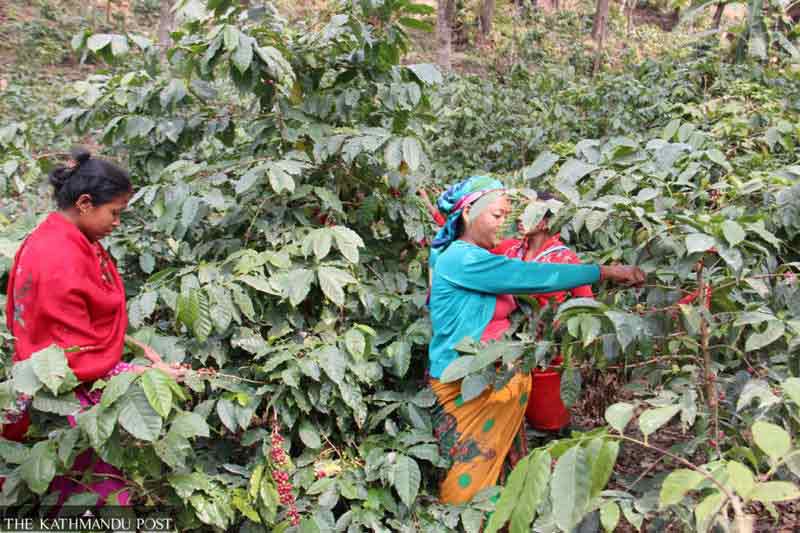
Farmers pick red cherry beans in Gulmi.
November 26, 2021
While coffee prices have surged to multi-year highs in the global market amid supply setbacks this November, prices in Nepal have remained stagnant, disappointing growers who are struggling to recover from the COVID-19 disaster.
Dhakeshwar Ghimire, proprietor of Nepal Organic Coffee Products in Palpa, told the Post that this year’s harvest had declined due to “black frost” in the winter.
“Brownish spots have appeared on large areas of the coffee plant in the highlands, but the crops in the lowlands were less affected by the blight,” said Ghimire, who has been producing organic coffee in Palpa since 1978. “Despite a fall in output, prices did not increase. The consumption of coffee in the domestic market too has dropped.”
Traders said that consumption and sales had plunged to near zero in 2020 as the lockdown kept people indoors after the government issued stay-at-home orders to prevent the spread of the coronavirus. The year 2021 too was not much better for coffee growers and sellers.
While coffee farmers suffered due to the black frost which damaged their crops, coffee buyers — mostly hotels and restaurants — remained shut for months and consumption dropped sharply.
According to Bloomberg, Arabica coffee prices hit a seven-year high on Nov. 11 due to low inventories in warehouses monitored by ICE Futures U.S., the main exchange for coffee futures.
Prices for coffee have rallied this year on numerous factors, but mainly due to a drought in Brazil, the world’s largest coffee producer. In July this year, the region’s rainy season hardly saw any rainfall during one of its worst droughts in almost a century, hurting the 2021 crop and dropping the coffee supply output in Brazil as plants withered.
“Normally, reduced production would prompt prices to go up; but in Nepal’s case, it did not happen,” Ghimire said. “Due to the reduced quality and subdued demand, we agreed to keep prices at last year’s level.”
Bishnu Prasad Bhattarai, executive director of the board, said that the minimum support price had been fixed on the basis of the cost of production. “Growers will get 20-22% of the profit margin,” he said.
According to the board, the country exported 72.48 tons of coffee beans worth Rs96 million in the last fiscal year 2020-21 that ended mid-July, a significant drop from 84.13 tons worth Rs99.61 million in 2018-19 before the coronavirus came down on the country.
In 2019-20, COVID-19 supply restrictions caused exports to drop to 46.89 tons valued at Rs57.72 million.
Nepal has been importing large amounts of coffee. In fiscal 2020-21, 198.76 tons of instant coffee worth Rs106.72 million entered the country.
Despite the lockdown, coffee imports in fiscal 2019-20 rose to 266.17 tons worth Rs118.84 million, up from 262 tons worth Rs98.01 million in 2018-19.
Farmers planted coffee on 3,053 hectares and produced 314.5 tons of green beans, the board said. Of the country’s total production, 25% is exported.
“There is a need to create awareness about farm insurance among growers. Besides, Nepal needs technology to increase output,” said Ghimire, whose coffee output is marketed under two brands — Himalayan Arabica and Mount Everest Himalayan Beans.
“Demand for Nepali organic coffee is huge in the global market, but Nepali growers are not able to fulfill even a fraction of the global requirement,” traders said.
According to the board, a total of 31,340 farmers are engaged in the production of coffee. Among the six provinces where coffee is grown, Bagmati has the highest annual production with 116.1 tons.
“The annual requirement of Nepali coffee drinkers amounts to 4,500-5,000 tons, but total output comes to only around 317.5 tons,” Bhattarai said.
In total, the country consumes 2,100 tons of coffee annually.
Nepali coffee growers are working to increase output, and the product could become a major source of foreign exchange for the country.
“We are introducing around eight high productive varieties to increase output. These varieties are suitable in Nepali climates. We have already written to the Ministry of Foreign Affairs and the Indian Coffee Board, the supplier, to support us,” Ghimire said.
Branding is another vital aspect to promote coffee cultivation in Nepal.
The board said that they had requested the Forest Ministry to allow the use of community forests for growing coffee. “It will be a huge boost for the coffee industry if the ministry approves our proposal,” Bhattarai said.
“We are planning to open two plants to produce instant coffee. To this end, we are currently preparing to conduct a feasibility study.”
Top Articles in World
-

Israeli Ambassador to Japan Speaks about Japan’s Role in the Reconstruction of Gaza
-

Videos Plagiarized, Reposted with False Subtitles Claiming ‘Ryukyu Belongs to China’; Anti-China False Information Also Posted in Japan
-

North Korea Possibly Launches Ballistic Missile
-

Chinese Embassy in Japan Reiterates Call for Chinese People to Refrain from Traveling to Japan; Call Comes in Wake of ¥400 Mil. Robbery
-

Russia: Visa Required for Visiting Graves in Northern Territories, Lifting of Sanctions Also Necessary
JN ACCESS RANKING
-

Japan PM Takaichi’s Cabinet Resigns en Masse
-

Japan Institute to Use Domestic Commercial Optical Lattice Clock to Set Japan Standard Time
-

Israeli Ambassador to Japan Speaks about Japan’s Role in the Reconstruction of Gaza
-

Man Infected with Measles Reportedly Dined at Restaurant in Tokyo Station
-

Videos Plagiarized, Reposted with False Subtitles Claiming ‘Ryukyu Belongs to China’; Anti-China False Information Also Posted in Japan
























